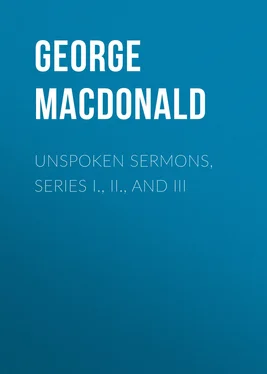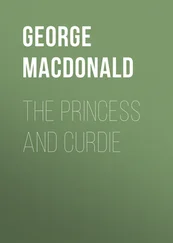George MacDonald - Unspoken Sermons, Series I., II., and III
Здесь есть возможность читать онлайн «George MacDonald - Unspoken Sermons, Series I., II., and III» — ознакомительный отрывок электронной книги совершенно бесплатно, а после прочтения отрывка купить полную версию. В некоторых случаях можно слушать аудио, скачать через торрент в формате fb2 и присутствует краткое содержание. Жанр: foreign_prose, foreign_religion, Философия, foreign_psychology, foreign_antique, на английском языке. Описание произведения, (предисловие) а так же отзывы посетителей доступны на портале библиотеки ЛибКат.
- Название:Unspoken Sermons, Series I., II., and III
- Автор:
- Жанр:
- Год:неизвестен
- ISBN:нет данных
- Рейтинг книги:4 / 5. Голосов: 1
-
Избранное:Добавить в избранное
- Отзывы:
-
Ваша оценка:
- 80
- 1
- 2
- 3
- 4
- 5
Unspoken Sermons, Series I., II., and III: краткое содержание, описание и аннотация
Предлагаем к чтению аннотацию, описание, краткое содержание или предисловие (зависит от того, что написал сам автор книги «Unspoken Sermons, Series I., II., and III»). Если вы не нашли необходимую информацию о книге — напишите в комментариях, мы постараемся отыскать её.
Unspoken Sermons, Series I., II., and III — читать онлайн ознакомительный отрывок
Ниже представлен текст книги, разбитый по страницам. Система сохранения места последней прочитанной страницы, позволяет с удобством читать онлайн бесплатно книгу «Unspoken Sermons, Series I., II., and III», без необходимости каждый раз заново искать на чём Вы остановились. Поставьте закладку, и сможете в любой момент перейти на страницу, на которой закончили чтение.
Интервал:
Закладка:
George MacDonald
Unspoken Sermons, Series I, II, and III
UNSPOKEN SERMONS FIRST SERIES
These Ears of Corn. gathered and rubbed in my hands upon broken Sabbaths, I offer first to my Wife, and then to my other Friends.
THE CHILD IN THE MIDST
And he came to Capernaum: and, being in the house, he asked them, What was it that ye disputed among yourselves by the way? But they held their peace: for by the way they had disputed among themselves who should be the greatest. And he sat down, and called the twelve, and saith unto them, If any man desire to be first, the same shall be last of all, and servant of all. And he took a child, and set him in the midst of them: and when he had taken him in his arms, he said unto them, Whosoever shall receive one of such children in my name, receiveth me; and whosoever shall receive me, receiveth not me, but him that sent me. ——MARK ix. 33-37.
Of this passage in the life of our Lord, the account given by St Mark is the more complete. But it may be enriched and its lesson rendered yet more evident from the record of St Matthew.
"Verily I say unto you, Except ye be converted, and become as little children, ye shall not enter into the kingdom of heaven. Whosoever shall humble himself as this little child, the same is greatest in the kingdom of heaven. And whoso shall receive one such little child in my name receiveth me. But whoso shall offend one of these little ones that believe in me, it were better for him that a millstone were hanged about his neck, and that he were drowned in the depth of the sea."
These passages record a lesson our Lord gave his disciples against ambition, against emulation. It is not for the sake of setting forth this lesson that I write about these words of our Lord, but for the sake of a truth, a revelation about God, in which his great argument reaches its height.
He took a little child—possibly a child of Peter; for St Mark says that the incident fell at Capernaum, and "in the house,"—a child therefore with some of the characteristics of Peter, whose very faults were those of a childish nature. We might expect the child of such a father to possess the childlike countenance and bearing essential to the conveyance of the lesson which I now desire to set forth as contained in the passage.
For it must be confessed that there are children who are not childlike. One of the saddest and not least common sights in the world is the face of a child whose mind is so brimful of worldly wisdom that the human childishness has vanished from it, as well as the divine childlikeness. For the childlike is the divine, and the very word "marshals me the way that I was going." But I must delay my ascent to the final argument in order to remove a possible difficulty, which, in turning us towards one of the grandest truths, turns us away from the truth which the Lord had in view here.
The difficulty is this: Is it like the Son of man to pick out the beautiful child, and leave the common child unnoticed? What thank would he have in that? Do not even the publicans as much as that? And do not our hearts revolt against the thought of it? Shall the mother's heart cleave closest to the deformed of her little ones? and shall "Christ as we believe him" choose according to the sight of the eye? Would he turn away from the child born in sin and taught iniquity, on whose pinched face hunger and courage and love of praise have combined to stamp the cunning of avaricious age, and take to his arms the child of honest parents, such as Peter and his wife, who could not help looking more good than the other? That were not he who came to seek and to save that which was lost. Let the man who loves his brother say which, in his highest moments of love to God, which, when he is nearest to that ideal humanity whereby a man shall be a hiding-place from the wind, he would clasp to his bosom of refuge. Would it not be the evil-faced child, because he needed it most? Yes; in God's name, yes. For is not that the divine way? Who that has read of the lost sheep, or the found prodigal, even if he had no spirit bearing witness with his spirit, will dare to say that it is not the divine way? Often, no doubt, it will appear otherwise, for the childlike child is easier to save than the other, and may come first. But the rejoicing in heaven is greatest over the sheep that has wandered the farthest—perhaps was born on the wild hill-side, and not in the fold at all. For such a prodigal, the elder brother in heaven prays thus—"Lord, think about my poor brother more than about me, for I know thee, and am at rest in thee. I am with thee always."
Why, then, do I think it necessary to say that this child was probably Peter's child, and certainly a child that looked childlike because it was childlike? No amount of evil can be the child. No amount of evil, not to say in the face, but in the habits, or even in the heart of the child, can make it cease to be a child, can annihilate the divine idea of childhood which moved in the heart of God when he made that child after his own image. It is the essential of which God speaks, the real by which he judges, the undying of which he is the God.
Heartily I grant this. And if the object of our Lord in taking the child in his arms had been to teach love to our neighbour, love to humanity, the ugliest child he could have found, would, perhaps, have served his purpose best. The man who receives any, and more plainly he who receives the repulsive child, because he is the offspring of God, because he is his own brother born, must receive the Father in thus receiving the child. Whosoever gives a cup of cold water to a little one, refreshes the heart of the Father. To do as God does, is to receive God; to do a service to one of his children is to receive the Father. Hence, any human being, especially if wretched and woe-begone and outcast, would do as well as a child for the purpose of setting forth this love of God to the human being. Therefore something more is probably intended here. The lesson will be found to lie not in the humanity , but in the childhood of the child.
Again, if the disciples could have seen that the essential childhood was meant, and not a blurred and half-obliterated childhood, the most selfish child might have done as well, but could have done no better than the one we have supposed in whom the true childhood is more evident. But when the child was employed as a manifestation, utterance, and sign of the truth that lay in his childhood, in order that the eyes as well as the ears should be channels to the heart, it was essential— not that the child should be beautiful but—that the child should be childlike; that those qualities which wake in our hearts, at sight, the love peculiarly belonging to childhood, which is, indeed, but the perception of the childhood, should at least glimmer out upon the face of the chosen type . Would such an unchildlike child as we see sometimes, now in a great house, clothed in purple and lace, now in a squalid close, clothed in dirt and rags, have been fit for our Lord's purpose, when he had to say that his listeners must become like this child? when the lesson he had to present to them was that of the divine nature of the child, that of childlikeness? Would there not have been a contrast between the child and our Lord's words, ludicrous except for its horror, especially seeing he set forth the individuality of the child by saying, "this little child," "one of such children," and "these little ones that believe in me?" Even the feelings of pity and of love that would arise in a good heart upon further contemplation of such a child, would have turned it quite away from the lesson our Lord intended to give.
Читать дальшеИнтервал:
Закладка:
Похожие книги на «Unspoken Sermons, Series I., II., and III»
Представляем Вашему вниманию похожие книги на «Unspoken Sermons, Series I., II., and III» списком для выбора. Мы отобрали схожую по названию и смыслу литературу в надежде предоставить читателям больше вариантов отыскать новые, интересные, ещё непрочитанные произведения.
Обсуждение, отзывы о книге «Unspoken Sermons, Series I., II., and III» и просто собственные мнения читателей. Оставьте ваши комментарии, напишите, что Вы думаете о произведении, его смысле или главных героях. Укажите что конкретно понравилось, а что нет, и почему Вы так считаете.












